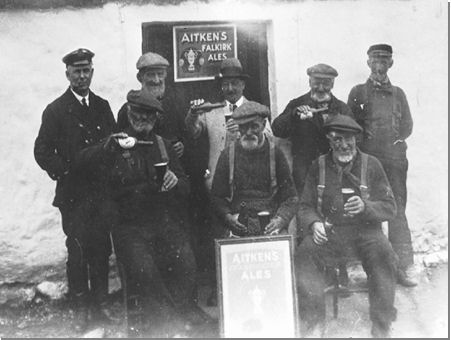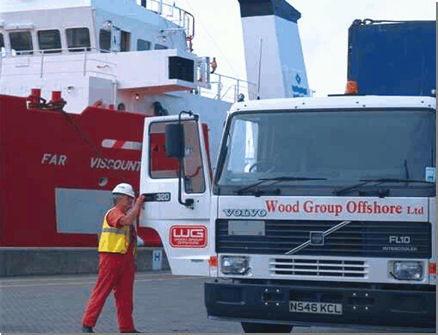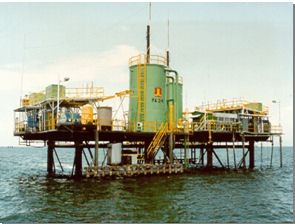Creating a global operation with revenues of more than $2 billion (£1.07bn) from a modest Scottish family fishing business with half a dozen ships is no mean feat.
After decades of growth at the Wood Group whose 14,000 employees now span 36 countries, it is tempting to believe that success has become easy and that the man at the helm can walk on water.
But Sir Ian, a down-to-earth Aberdonian, who recently presided over the company’s second fall in profits since flotation in 2002, is probably the least likely Scottish business leader to succumb to notions of invincibility.
Reflecting on the last year’s trading at Wood Group, Sir Ian says: “We got our feet wet last year but we’ll try to avoid doing that again … I hope we’ve reacted fast enough and made changes quick enough.”
Taking a company from private ownership to the full glare of public scrutiny on the stock market is a tough task for any founding chief executive, especially one whose vision, intellect and energy has played such a huge part in charting the direction.
For Sir Ian, the initial transition was a smooth one – the IPO in 2002 was seven times oversubscribed – and Wood’s enviable growth record looked unshakeable.
But 2004 brought a rude awakening, as earnings (before interest tax and amortisation) tumbled 15% to $117 million (£63m), largely due to difficulties in its gas turbines division and lower volumes in the deepwater engineering market.
Wood still managed to notch up a 15% increase in revenues to $2.28bn (£1.22bn) but Sir Ian admits: “We did the IPO in the belief that we could continue with our super record of growth and last year we stumbled badly … In terms of being a [relatively] new IPO, it was a great disappointment.”
Wood says his senior management team has worked hard to tackle problem areas, notably gas turbines (now under the leadership of deputy chief executive Allister Langlands) and he is confident of a return to acceptable growth in 2005.
Sir Ian says Langlands has taken a number of steps to cut costs, increase efficiency, focus on high-tech component repair contracts and extend long-term maintenance agreements.
“We moved into that market when the Enron issue changed its status overnight from believing there was an under-supply to an over-supply. I believe last year is the bottom [for gas turbines],” he says.
Sir Ian adds that staff morale remains high, despite the dip in profits last year.
“No-one, frankly, within Wood felt as depressed as the public markets coverage might have implied … My colleagues look back at last year and see revenues went up, we continued our international development and we made a big development spend.”
Wood, which has developed a global reputation for creating innovative technical and engineering solutions, made an investment and capital spend of $131m (£70.2m) in 2004, up from $99.6m (£53.4m) in 2003, as part of its efforts to enhance products and services.
Wood Group had a range of private equity backers, including prominent Scottish institutional investors, long before its IPO and Sir Ian says this paved the way for the transition to public company status.
“We’ve had institutional shareholders since 1981, so [flotation] wasn’t as traumatic a change as it might have been if we had just been a purely private company,” he says.
Some of Wood Group’s long- standing backers, which included Aberdeen Asset Management, made as much as 25 times their original stake when the company floated on the London stock market in June 2002.
Growth rocketed in the decade running up to the IPO, with revenue doubling from just under $400m in 1993, to $800m by 1997, shooting through the $1bn in 2001 and passing $2bn in 2004.
Although the North Sea remains a key market for Wood, in the past few years there has been a gradual reduction in the proportion of revenue derived from that area, which now stands at less than 25% of total sales, reflecting growth in earnings from other oil provinces.
As joint chairman of the UK’s oil industry leadership team, Sir Ian is a passionate advocate of the need to prolong the productive life of the UK continental shelf (UKCS).
He is adamant that, with the right kind of incentive and risk-sharing agreements in place, significant new finds can be made, particularly in new areas such as west of Shetland.
He recently gave a presentation to the trade and energy ministers entitled “A tale of two futures”, one being rapid decline of the UKCS with 40% of the infrastructure decommissioned by 2020 and game over effectively by 2030.
The upbeat alternative is an extended life scenario where production continues to 2050 or beyond and at least another 28 billion barrels of oil are produced.
For this to happen, Sir Ian says operators must invest in exploration and production; contractors must improve efficiency to contain unit costs; there must be more outsourcing; more adoption of new technology; skilled staff must be retained and recruited; and government must minimise regulation and maintain fiscal stability.
He argues that the prize for maximising recovery is “staggering”.
“The difference between the high 28 billion [barrels of oil equivalent per day] and low 14 million at $40 a barrel represents $560bn of economic value to the UK,” Sir Ian says.
An outspoken character, he got angry back in the 1970s when local people in Aberdeen were fearful of what US oil companies might do to them instead of figuring out how they could get a slice of the action for themselves.
Back in 1979, Sir Ian shocked his father by spending the equivalent of the cost of one and a half fishing vessels to mount a lavish stand at an oil exhibition. It was a typically prescient action, demonstrating his ability to anticipate change and plan accordingly.
He inspires a strong loyalty among his workforce and is as comfortable chatting to staff in Aberdeen in his old cardigan as he is addressing workers in his shirt-sleeves in Caracas or Houston.
With a first-class degree in psychology, he is adept at reading people and warns of the insidious effect on recruitment of continually referring to the North Sea as a sunset industry, which he warns is “damaging and potentially self-fulfilling”.
He believes the industry has to do more to attract new recruits and says in future they may come from other nations as the global competition for human capital hots up, particularly China which turns out two million engineering graduates every year.
“You can see that as a threat or an opportunity; we see it as an opportunity,” he says.
“There is a significant resource shortage right now. Some companies are not bidding for contracts right now on the basis they have not got the people,” warns Sir Ian.
In an industry where the average age of workers is roughly 50, grooming the next generation of leaders is important. Sir Ian says that at Wood Group, succession plans are in place.
This summer marks Sir Ian’s 63rd birthday, and he remains committed to steering the group until he is 65. “I won’t become a 70-year-old Scottish chairman,” he promises.
But the former chairman of Scottish Enterprise is not planning to retire to the golf course. “I enjoy being constructive and I will certainly carry on doing things.”
For now, his vision remains global and his appetite to grow the business he created, undiminished.
|






 Born and educated in
Aberdeen, Sir Ian Wood attended Robert Gordon's
College before graduating from Aberdeen University in 1964 with a
first-class honours degree in psychology. He then joined the family
business, John Wood & Son, and became managing director in 1967. As well as his commitment to the Group, Sir Ian holds many appointments
within the UK including joint Chairman of the Oil and Gas Industry
Leadership Team and member of PILOT (joint Government/ Oil & Gas Industry
initiative). In December 2000 he retired as Chairman of Scottish
Enterprise and as Chairman of the British Trade International Oil and Gas
Export Board (previously OSO).
Born and educated in
Aberdeen, Sir Ian Wood attended Robert Gordon's
College before graduating from Aberdeen University in 1964 with a
first-class honours degree in psychology. He then joined the family
business, John Wood & Son, and became managing director in 1967. As well as his commitment to the Group, Sir Ian holds many appointments
within the UK including joint Chairman of the Oil and Gas Industry
Leadership Team and member of PILOT (joint Government/ Oil & Gas Industry
initiative). In December 2000 he retired as Chairman of Scottish
Enterprise and as Chairman of the British Trade International Oil and Gas
Export Board (previously OSO).